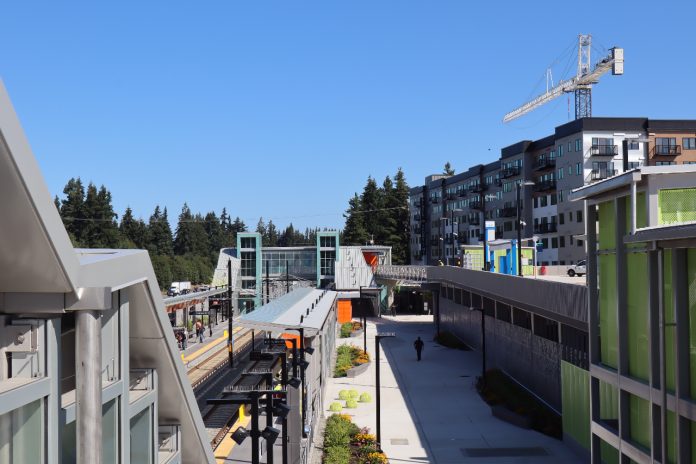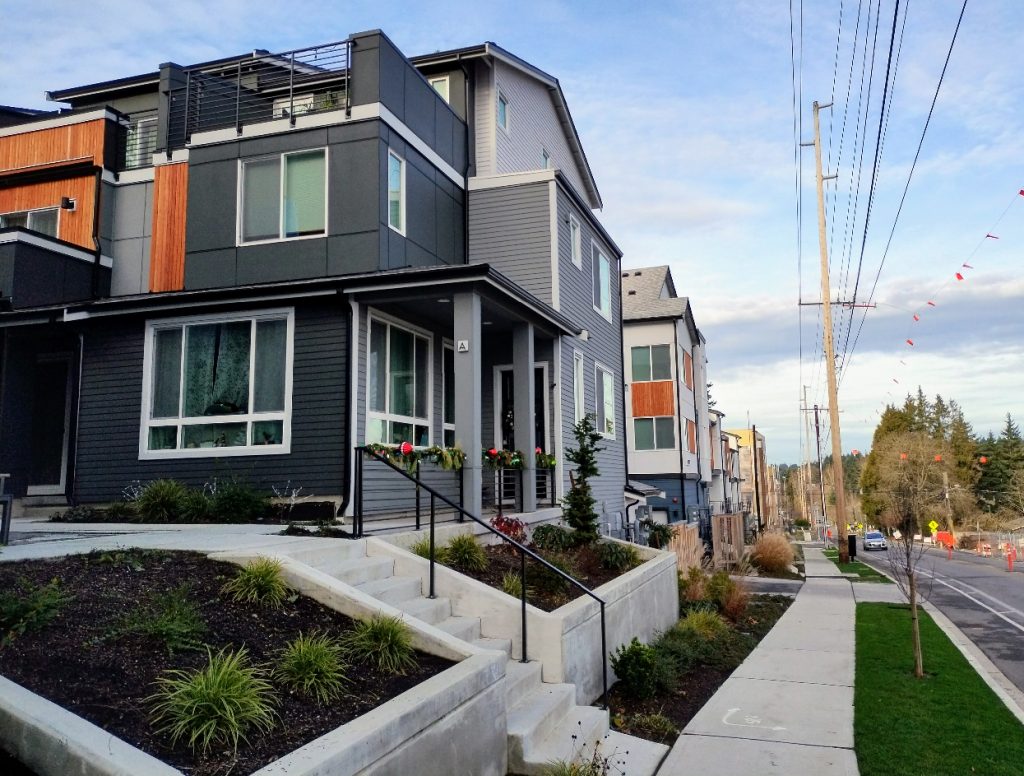
The Shoreline City Council voted 6-0 Monday night to fully eliminate mandates for off-street parking stalls as part of new development everywhere in the city. The move follows in the footsteps of other Washington cities including Spokane, Bremerton, and Bothell, which have all adopted similar policies in recent months.
Dropping parking mandates is intended to help ease housing costs and provide more flexibility to homebuilders. Letting builders tailor parking to expected demand is intended to reduce the number of excess stalls, which can cost upwards of $60,000 per underground parking stall, according to the Sightline Institute, a local environmental thinktank that supports parking reform.
“This really takes a large step to addressing affordability in the city, and as parking is one of the largest pieces of affordability for new development,” Shoreline Mayor Chris Roberts, who has served on the council since 2010, told The Urbanist ahead of the vote. “It will make a difference, making sure that more houses are built within the city.”
Shoreline’s vote fulfills a promise the council made late last year to adopt the change as a part of updating the City’s 20-year growth plan.
One of the fastest-growing cities in Puget Sound, Shoreline has been aggressive about reducing barriers to homebuilding in the city, particularly around its two light rail stations, which opened last year. Well ahead of the start of train service, Shoreline rezoned significant areas around the 148th Street and 185th Street Station, a move which has clearly paid off. Between 2019 and 2024, the city issued permits for over 4,600 new homes, a number that translates to nearly 20% of the existing housing stock within Shoreline.
But Shoreline’s zoning code has continued to require 0.75 to 1.5 parking stalls for every unit, with only a potential 50% reduction in the amount of off-street parking available for projects near transit.
“We want affordable housing, and reduced hardscape, and trees, and something’s got to give if you’re mandating all those things, and parking is the obvious choice,” Councilmember Keith Scully said at a meeting last week on the topic.

Roberts also sees right-sizing the amount of parking being built in Shoreline as advancing the city’s goals around making it easier to get around the city by walking and biking. Shoreline’s safe bike network continues to be built out.
“There’s so many people in Shoreline who don’t drive and who rely on other forms of transportation to get around, whether walking, by bike or public transit, and we have to make sure that people have access to all different forms of mobility, and not just cater to one type of transportation,” Roberts said. “We want to see more of our development around the light rail stations, around places with frequent transit on Aurora, so that people who choose can get around the city and get around the region without a car.”
Fostering more small-scale commercial storefronts closer to homes also brings Shoreline closer to that goal, and it was a major impetus behind a December vote to legalize neighborhood cafes and corner stores, a policy that was replicated in nearby Bothell last month.
Shoreline’s vote is likely to be among the first in a wave across the state in the coming months, following the passage of Senate Bill 5184 this spring. That law sets a new ceiling on minimum parking requirements at 0.5 stalls for every unit in apartment buildings, and spells out an array of instances where no parking can be required, including with affordable housing, smaller apartment units, mixed-use commercial spaces, and senior housing. Cities and counties will have anywhere from 18 months to three years to comply, depending on their population, and many may decide that simply eliminating those minimums makes more sense.
In Seattle, a proposal wrapped up in the draft One Seattle Comprehensive Plan update wouldn’t even go as far as the new state baseline, requiring more work by the end of 2026. But citywide Councilmember Alexis Mercedes Rinck has proposed an amendment that would follow Shoreline in dropping all parking mandates, which is set to be taken up in September.
“A growing number of cities right here in Washington state have found that when parking minimums are repealed, parking does still get built,” Shoreline resident Katie Lorah, founder and lead organizer with Urbanist Shoreline, told the council Monday. “It just doesn’t get over built based on arbitrary numbers that were set a long time ago, and it’s frankly just way more appropriate for an urban fabric like our own, where we’re trying to emphasize infill housing, middle housing, mixed use projects, everything that our zoning code is built to support.”
Parking is a topic that has prompted considerable rancor and debate elsewhere, but in Shoreline, the issue hasn’t proven incredibly controversial. Ahead of the final vote Monday, just one Shoreline resident voiced opposition to the change.
“I think we have a community that is largely aligned and largely recognizes the benefits of not only increased density, but also our commitment to — passion around — protecting the environment,” Roberts said. “I think we did a lot of work with the community to say: these are the benefits — from environmental benefits to affordability benefits to just general city revenue benefits — all of the things benefit from the more people choosing, and I think rightly choosing, to want to live in Shoreline.”
Ryan Packer has been writing for The Urbanist since 2015, and currently reports full-time as Contributing Editor. Their beats are transportation, land use, public space, traffic safety, and obscure community meetings. Packer has also reported for other regional outlets including BikePortland, Seattle Met, and PubliCola. They live in the Capitol Hill neighborhood of Seattle.


